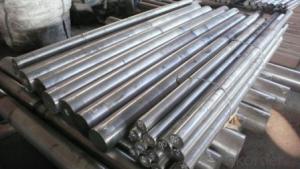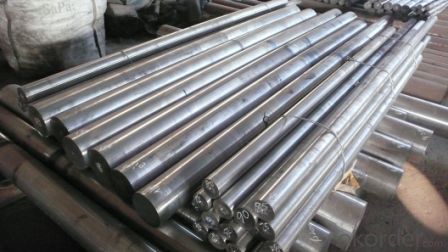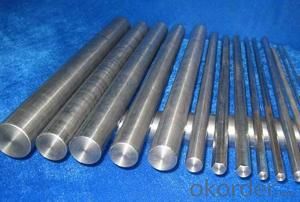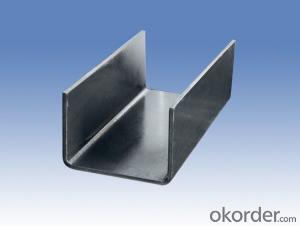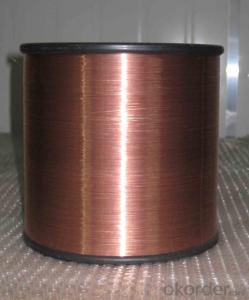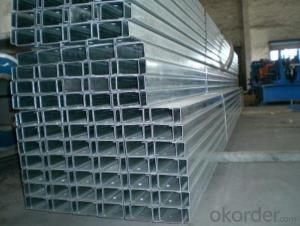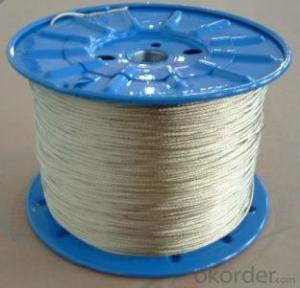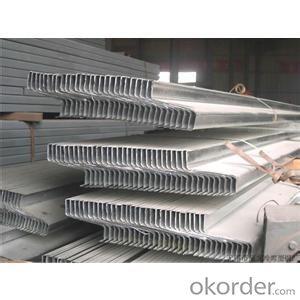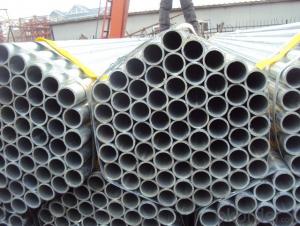Tool Steel with Many Kinds and Sizes
- Loading Port:
- China main port
- Payment Terms:
- TT or LC
- Min Order Qty:
- 25 m.t.
- Supply Capability:
- 10000 m.t./month
OKorder Service Pledge
OKorder Financial Service
You Might Also Like
Product Description:
OKorder is offering Tool Steel at great prices with worldwide shipping. Our supplier is a world-class manufacturer of steel, with our products utilized the world over. OKorder annually supplies products to European, North American and Asian markets. We provide quotations within 24 hours of receiving an inquiry and guarantee competitive prices.
Product Applications:
High Quality Bearing steel is used for manufacturing ball, roller bearing steel and rings. Bearing in work is under great pressure and friction, so have high demands bearing steel and hardness and resistance, and high elastic limit.
Bearing steels are used for ball and roller bearing applications and are comprised of low carbon steels and high carbon through harden able steel.
For example, bearing ring, steel rolling mill, machinery, 100Cr6 bearing steel ball is widely used in high-speed and low-noise bearing, bicycle, motorcycle, automobile, bags electronically.
Product Advantages:
OKorder's Tool Steel are durable, strong, and resist corrosion.
Main Product Features:
· Premium quality
· Prompt delivery & seaworthy packing (30 days after receiving deposit)
· Corrosion resistance
· Can be recycled and reused
· Mill test certification
· Professional Service
· Competitive pricing
Product Specifications:
Grade | bearing steel EN-31 |
Dimensions | Diameter: 20-280mm Length: 2000-5800mm |
Shape | Round Bar |
Type | High chromium bearing steel |
HBS | <220< span=""> |
Standard | AISI |
Technique | Hot Rolled |
Note of High Quality Bearing Steel
1. According to national standard (GB) for our products, if not, supply according to national standards (GB) or agreement.
2. We can not only provide electric furnace +LF+VD and electros lag re-melting (ESR) steel forging materials, but also forging products of piece, bar, etc.
3. Our company is equipped with roll equipment and can provide our customers with roll billets or finished.
4. The materials that we purchase are all accord with International General Standard; you could check it out on the Material Quality Sheet.
5. We are the creator of the “seven-step inspect method” in China.
FAQ:
Q1: Why buy Materials & Equipment from OKorder.com?
A1: All products offered byOKorder.com are carefully selected from China's most reliable manufacturing enterprises. Through its ISO certifications, OKorder.com adheres to the highest standards and a commitment to supply chain safety and customer satisfaction.
Q2: How do we guarantee the quality of our products?
A2: We have established an advanced quality management system which conducts strict quality tests at every step, from raw materials to the final product. At the same time, we provide extensive follow-up service assurances as required.
Q3: How soon can we receive the product after purchase?
A3: Within three days of placing an order, we will begin production. The specific shipping date is dependent upon international and government factors, but is typically 7 to 10 workdays.
Images:
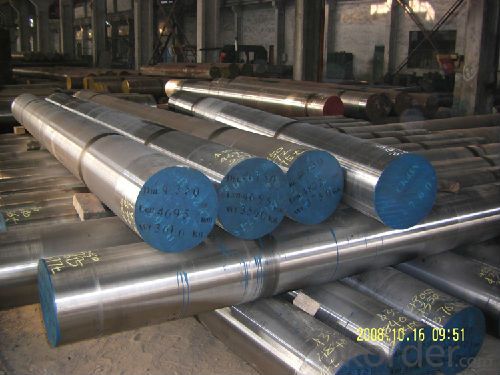
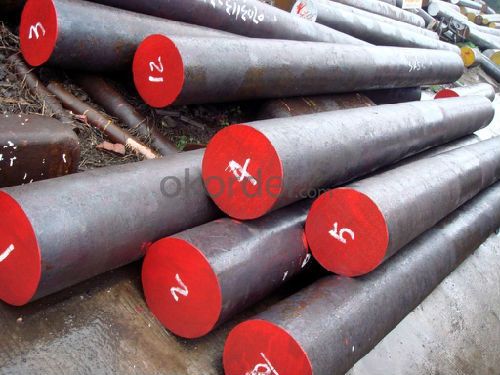
- Q: What are the different types of steel round bar alloys for improved hardness and strength?
- Improved hardness and strength are characteristics associated with various types of steel round bar alloys. Some commonly used alloys renowned for these qualities include: 1. Carbon Steel: Exceptional strength and hardness make carbon steel a popular choice. Its higher carbon content enhances durability and resistance to wear and tear. 2. Alloy Steel: Combining carbon steel with elements like manganese, nickel, chromium, or vanadium results in alloy steel. These additions enhance hardness and strength, making it suitable for applications requiring high tensile strength and toughness. 3. Stainless Steel: With a minimum chromium content of 10.5%, stainless steel is a corrosion-resistant alloy. Chromium's addition improves hardness and strength, making it ideal for applications demanding resistance to corrosion, heat, and wear. 4. Tool Steel: Tool steel is tailor-made for manufacturing various tools. It boasts high hardness, wear resistance, and strength. Elements like tungsten, molybdenum, or vanadium are often added to enhance its performance. 5. High-Speed Steel: Developed specifically for high-speed cutting tools like drills and milling cutters, high-speed steel excels in hardness and retains its cutting edge even at high temperatures. 6. Maraging Steel: Maraging steel, a low-carbon, high-nickel alloy, stands out for its exceptional strength, toughness, and resistance to fatigue. It finds applications in industries like aerospace and defense that demand high strength and durability. These examples merely scratch the surface of the steel round bar alloys known for improved hardness and strength. The choice of alloy depends on the intended application and desired properties for the final product.
- Q: Are steel round bars recyclable?
- Indeed, recyclability is a characteristic inherent to steel round bars. Steel, being of immense value and easily recyclable, is among the most frequently recycled materials worldwide. Once steel round bars have served their purpose, they may be gathered and dispatched to a recycling facility. Within this facility, the round bars are subjected to the melting process, resulting in their conversion into novel steel products. Remarkably, this cycle can be perpetually repeated without any detrimental impact on the steel's quality. By choosing to recycle steel round bars, not only do we aid in the preservation of natural resources and the reduction of waste, but we also contribute to energy conservation and the mitigation of greenhouse gas emissions as opposed to the production of steel from raw materials.
- Q: What are the common alloying elements used in steel round bars?
- The common alloying elements used in steel round bars are carbon, manganese, silicon, sulfur, and phosphorus. Carbon is the most important alloying element and is responsible for the strength and hardness of the steel. It enhances the overall performance and makes the steel more durable and resistant to wear and tear. Manganese is another crucial element that improves the hardenability and strength of the steel. It also helps in reducing the brittleness and increasing the toughness of the material. Silicon is added to enhance the steel's resistance to oxidation, while sulfur and phosphorus are added in small amounts to improve machinability. These alloying elements work together to create steel round bars with specific properties suitable for various applications in industries such as construction, automotive, and manufacturing.
- Q: How are steel round bars used in the manufacturing of valves and fittings?
- Valve and fitting manufacturing commonly utilizes steel round bars for their strength, durability, and versatility. These bars serve as the primary raw material for various valve and fitting components. A significant application of steel round bars in valve manufacturing involves producing valve stems. Valve stems control fluid or gas flow through the valve. The round bars are machined and threaded to create the stem, which connects to the valve disc or plug. Steel round bars are chosen for this purpose due to their high tensile strength, ensuring the stem can withstand the required pressure and torque to operate the valve. In fittings manufacturing, steel round bars are frequently used to produce threaded connectors, nipples, and couplings. These components are integral for joining pipes or tubes, enabling fluid or gas transfer in different systems. Steel round bars are easily machinable, allowing manufacturers to create precise threads and shapes necessary for these fittings. Additionally, steel round bars are also employed in fabricating the body or housing of valves and fittings. The bars can be cut, forged, or machined into the desired shape, providing a robust and dependable structure for the valve or fitting. The use of steel in the body guarantees the component's ability to endure high pressures, temperature fluctuations, and corrosive environments. In conclusion, steel round bars have a crucial role in valve and fitting manufacturing. Their strength, durability, and machinability make them an exceptional choice for creating vital components like valve stems, threaded connectors, and the bodies of valves and fittings.
- Q: Can steel round bars be used in the manufacturing of bicycles?
- Yes, steel round bars can be used in the manufacturing of bicycles. Steel is a commonly used material in bicycle manufacturing due to its strength, durability, and affordability. Steel round bars can be shaped, welded, and manipulated to form the frame, handlebars, and other components of a bicycle.
- Q: What is the maximum length of a steel round bar?
- The maximum length of a steel round bar can vary depending on several factors such as the manufacturing capabilities, transportation limitations, and specific requirements of the project. However, in general, steel round bars can often be manufactured and transported in lengths of up to 12 meters (40 feet) or longer.
- Q: What are the different types of steel round bar surface finishes for corrosion resistance?
- There are several types of steel round bar surface finishes that provide corrosion resistance. Some common options include polished, brushed, satin, and electropolished finishes. Additionally, coatings such as galvanized, black oxide, and powder coating can also be applied to steel round bars to enhance their corrosion resistance.
- Q: Can steel round bars be galvanized?
- Indeed, it is possible to galvanize steel round bars. Galvanization is a technique that entails applying a protective zinc coating to the steel surface to prevent corrosion. This technique can be employed on various steel products, including round bars. By galvanizing steel round bars, not only is their resistance to corrosion enhanced, but also their durability and lifespan. The galvanization process entails immersing the round bars in a bath of molten zinc, which adheres to the steel and forms a protective layer. This layer serves as a barrier, safeguarding the steel from moisture, chemicals, and other corrosive elements. Consequently, galvanized steel round bars are extensively used in outdoor applications, such as construction, fencing, and marine environments, where they are exposed to harsh conditions.
- Q: Can steel round bars be used in the production of musical equipment?
- Musical equipment production can indeed incorporate steel round bars. Steel, being a robust and long-lasting substance, is frequently employed in constructing diverse musical instruments. Structural features like frames, braces, and supports for guitars, drums, and pianos can all be fashioned from steel round bars. Furthermore, steel can be utilized to manufacture sound-enhancing components such as resonators or bellows in certain instruments. The adaptability and dependability of steel render it an appropriate selection for the production of musical equipment.
- Q: What are the different grades of steel round bars available?
- There are various grades of steel round bars available, each with different properties and applications. Some common grades include: 1. Mild Steel: This grade is the most commonly used and affordable option. It has a low carbon content and is easy to weld, cut, and form. Mild steel round bars are suitable for general construction projects, fabrication, and manufacturing. 2. Carbon Steel: With a higher carbon content than mild steel, carbon steel round bars offer greater strength and hardness. They are often used in applications that require high strength, such as machinery parts, shafts, and axles. 3. Alloy Steel: Alloy steel round bars are made by adding various alloying elements such as chromium, nickel, manganese, or molybdenum to improve specific properties. These bars offer enhanced strength, toughness, and wear resistance, making them suitable for applications like automotive parts, gears, and tools. 4. Stainless Steel: Stainless steel round bars are corrosion-resistant and have excellent mechanical properties. They are widely used in industries such as construction, food processing, and medical equipment manufacturing. Different grades of stainless steel, such as 304, 316, or 410, offer varying levels of corrosion resistance and strength. 5. Tool Steel: Tool steel round bars are specifically designed for making tools and dies. They have high hardness, wear resistance, and heat resistance properties. Tool steel grades like D2, A2, or O1 are commonly used for making cutting tools, molds, and dies. It's essential to select the appropriate grade of steel round bars based on the specific requirements of your project, considering factors such as strength, corrosion resistance, hardness, and machinability. Consulting with a steel supplier or an engineer can help identify the most suitable grade for your application.
Send your message to us
Tool Steel with Many Kinds and Sizes
- Loading Port:
- China main port
- Payment Terms:
- TT or LC
- Min Order Qty:
- 25 m.t.
- Supply Capability:
- 10000 m.t./month
OKorder Service Pledge
OKorder Financial Service
Similar products
Hot products
Hot Searches
Related keywords
